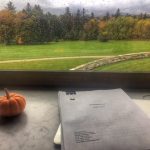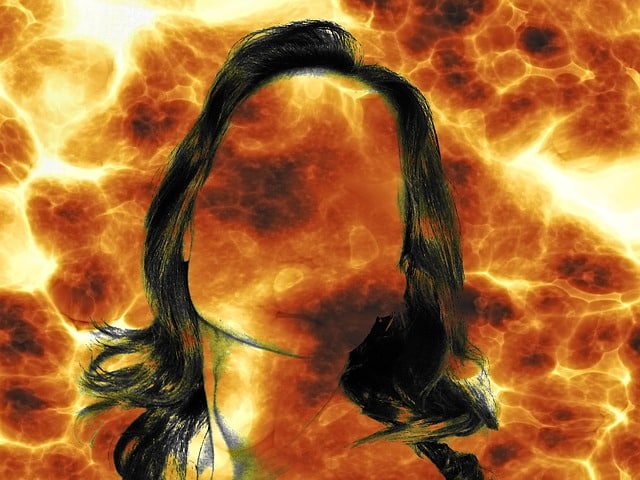By Leslie Lindsay
My mother is crazy. This is no lie.
She is not fun-day-at-the-mall-get-whatever-you-want crazy; she is flaming-crimson-I’m-going-to-kill-you-because-you-are-the-devil-crazy. Her eyes are glassy and bright, pockets of sunshine reflecting in the darkness. They dart from side to side, to side. She lifts her cigarette, inspects it like a specimen then plunges it into her mouth. There’s a pop as she pulls it out, rimmed with bold berry lipstick, then shakes off the ashes.
My mother is crazy.
She thinks she killed the postman. This comes out in puffs of gray, a frenzy of words not connecting. I’m sorry. I didn’t. Mean. Tokillthepostman.
Dust motes dance in the sunlight peering from the gauzy drapes. She reaches out; her slim, menthol-smelling fingers attempt to pinch the flakes of dead skin cells, bug fragments, and sparkles of emptiness. Diamonds, she says. She throws her head back, cackles, then reaches for her mug of hot tea. Steam rims the cup, hot and life-giving.
I-should-have-killed-you-when-I-had-the-chance. She turns, assesses my reaction. What’s there to say? I wished you had? So glad you didn’t. Thank you. Wait. You’re not making any sense. A pucker of skin cinches between her eyes, above her nose. Did you hear me? Hold on. Don’t touch me. You don’t understand. Intervention is the wrong thing here.
My grandmother said she should have chopped her up and flushed her down the toilet. Good-bye, so long. When she was a girl, my mother thought she saw the face of Jesus in the wood grain of her bedroom door. Good-night, sleep-tight. He never helped her, though she prayed for Him to come and take away the excruciating pain of her migraine headaches.
As a child, she had an antique Dirndl doll with a white glass face glossy and pink discs for cheeks, black hair. The legs were tightly bound white cloth with tall black boots that clanged and scratched when the doll was hugged, played with. I wonder: did she take that doll into the darkened corners of the hall closet, the one smelling of leather shoes and wet umbrellas, the mustiness of worn coats, where her parents locked her when they had had enough of her antics? Did she whisper secrets to that doll, who could not hear, but saw everything?
My mother is crazy.
She is not lets-paint-the-kitchen-red-crazy, she is full-on, I’m-an-angel-and-I-can-fly-crazy. Her silk nightie lifts and lowers, flits and dips around her ankles. Her small feet are tucked into ballerina-style house slippers with slick leather bottoms, with a bow at the top of her foot, near her toes. She pushes and shoves, grits her teeth. Not there, please don’t make me go to the hospital. Her breasts bob and sway. I glimpse the dark circle of her areola under the diaphanous fabric and quick—look away.
The milk she gave was sour. It was never enough. I was never enough. “You don’t love me,” she said. Her words drip with malice and smell of rot. But what about me, don’t you love me? I know better than to ask; it’s always about her. Always and always and always. About her.
It is summer. Cicadas invade. Red, beady eyes, translucent wings, black bodies. An incessant hum, loud and intoxicating, primal and wrong. They surge from the depths of the darkened ground, emerging from hell. The holes they leave in the earth mar the lush landscape. A dome of humidity drapes over the world, like a shroud. She bares her teeth, a rabid dog. “Mark,” she tells my dad, “Should I kill the girls while you are at work, or do you want to?”
She goes, reluctantly, to the hospital. It’s a battle of wills. In the car, out of the car. Reaching for dad’s keys, demanding to drive. The black road flashes from the car door. Whoosh! No mom. No. The car smells of fear and emptiness, old socks. “I’d rather die than go to the loony bin,” she wails.
My mother is crazy. This is no lie.
Once, she spray-painted the hydrangeas silver because they turned brown from too much sun. She stayed up all night sewing and sewing and sewing, but never finishing. She ripped the hems out and started again, this time they would be better, grander. She takes me to Hamburger Heaven and we dip our burgers into the sweet, tangy special sauce. She leans forward and I see her eyes dance with delight. “Want to do something wild and crazy,” she says.
“Like what?” I say, chewing.
“Like smoke some dope?” She throws her head back, showcasing her long, lean neck, golden tan, a knob of peach where her collarbone juts out.
I am ten. I do not smoke anything except bubble pipes and candy cigarettes.
We see her at the hospital, in the hallway outside her rubber room. Her silk nightie has been replaced with a white and blue johnny. It does not cover her behind. Her legs are prickly and her face is gray, saggy. I look into the Plexiglass slot in the big, heavy door. Inside, there are no swags or a grand canopy bed with lace and matching throw pillows, like at home. There is a mattress on the floor, thin and navy blue. It is pushed against a spongy wall. My eyes lift to the ceiling. Wall-to-wall softness. A single light switch is on the outside of the room. A chamber, a cell. Plush; almost, but not quite.
My mother grabs hold of me, “Oh baby!” she coos. “You came.” My ribcage slams into her hip bone. She squeezes and smells rancid, like rotting meat, old cigarettes, and dirty hair. I wince and twist from her embrace. My mother is a husk, like the cicadas that litter the landscape.
It starts to crumble, our house. Where once there was a tiny fissure of unease, it has grown into the size of a fault line, large and jagged and gaping. I think it may open wide, swallow the entire two-story in one single gulp, rejecting the pieces that are indigestible: shards of glass and thick mortar, brass doorknockers and kick plates.
She once set fires to homes as a child, just for fun. There was no one living there, who cared? Let’s see what happens. We’ll never get caught. She ran. A match left behind, a can of fuel. Blush and pink landscapes of oceans filled canvases. Her high school art teacher said she was a gifted artist; she called herself a creative genius. Fire was in her soul.
Our house started out plain and became luxurious. She keeps saying: Grasscloth and floral print. White whicker and balloon valances. She flits and flutters. Chitz. Jabot. Swag. I loved the sound of these names and labels, the feel of them in my mouth. Kirsch. Levelor. Waverly. Laura Ashley. Nurseries and dining rooms. Master bedrooms and basement rec rooms. Blue and white ticking. Cornices and Roman shades. All day, all night, till the cows came home. Powder rooms and towel rings. Braided rugs and brass cake molds. Blue and mauve. Mauve and blue.
She thought she was pregnant at thirteen. Some boy named McCracken. Oh, she didn’t love him, probably didn’t even understand what real love was, but relished in the idea of someone depending on her. A boy or girl? It was one of life’s magical, mystical miracles. She began sewing baby clothes. A sleep sack, a blanket. She taught herself to knit, churning out yellow booties with a slip of a satin ribbon. She rubbed her slightly round, pubescent belly cloaked in a pink Hound’s-tooth tunic. And then a smear of rust in her undies; no baby. No McCracken kid, either.
At fourteen, my mother becomes an aunt for the first time. Her sister, older by two years, already had an abortion, traveling to New York City so the little invader can be sucked legally from her body. She played it off as a special mother-daughter shopping trip in the Big Apple, a hoax.
And now, a bouncing baby girl with a head full of dark curls, chocolate eyes. Her sister moves to a trailer in the family’s backyard, plays house with the hunky boyfriend, who has slipped a small-stoned promise ring on the sister’s finger. All day, all night that trailer rocks and sways with the footfalls of Lori and Bobby, the slams and screams, the wailing infant. My mother, desperate to belong snoops around, watches from the tall grass, sees her reflection in the darkening windows, and wonders what will become of her.
Two years later, she’s an aunt times two.
She must get out of there, that home that was no good, where her parents fought and cursed and called one another names. And so she glommed on to my dad one spring day at the Waffle House, hooking her arm through his and sharing a meal. She had just broken up with a guy named Tim, whom she said ‘could’ve been your dad.’ Tim, the name of a long-haired druggie or a pimple-faced weakling. No offense to anyone named Tim. It was fortunate they broke up.
A year later, a peach August wedding and then, a year and a half after that, a Christmas baby: me.
The milk she gave was sour.
My mother is crazy.
In Hawaii, she thought the demons would leave her. She thought she was in paradise. Tree branches hung laden with fruit. Delicious and tempting, but still, something was off. She shaved her head. Made frantic phone calls. Rode her scooter all around the Big Island. Got jobs decorating for the Ritz-Carleton, the governor of Alaska’s vacation home. She had a ‘spiritual marriage’ to one of the most wealthy inventors of the twentieth century. “Don’t you know, I am pregnant with twins…both are the Messiah.” She had already had a hysterectomy. When the authorities came to take her away, she brandished a knife.
Out of the island and into the fire. Deep and scorching. Barren, yet with brains tightly coiled with unrest, ideas, brimming with creativity. She won’t blow them out with a shot gun like great aunt Lorraine. No, it won’t be anything like that, don’t worry.
In the Heartland, she paces and fritters about; peace just out of her grasp, elusive. She barges in houses, threatens best friends, former lovers. “I have a big, black bodyguard who will see you through,” she sneers. He has brass knuckles and biceps big as my entire body, she said.
Palm trees don’t exist in southern Missouri. A gray green body of water replaces the rollicking white caps and cerulean blue waters of Hawaii. A lace of dew and a dome of smog hang over the Section 8 housing in which she lives. The screen is torn and flapping from the wood frame, there is no air conditioning. On the wall, above her mattress, grease spots from heads dirty the surface. The veneer of the dresser is chipped, cigarette burns freckle the facade. In the trashcan, photos in brass frames of family members sink to the bottom, cracked and tarnished.
And on that bed, lies my mother, crazy no more.

We are proud to have founded the Aleksander Fund. To learn more or to donate please click here. To sign up for On being Human Tuscany Sep 5-18, 2018 please email je*******************@***il.com.

On Being Human
Join Jen in Western Massachusetts at Kripalu
March 2 @ 7:30 pm – March 4 @ 11:00 am
For women and non-gender conforming humans.
Get ready to become more free as you tell the truth about who you are and listen fiercely to others doing the same. Get ready to create what it is you truly want for yourself. This program is an excavation of the self, a deep and fun journey into questions such as: If I wasn’t afraid, what would I do? Who would I be if no one told me who I was?
Go beyond your comfort zone to explore what it means to be creative, human, and free—through writing, asana, and maybe a dance party or two! Jennifer’s focus is less on yoga postures and more on diving into life in all its unpredictable, messy beauty.

Thank you for writing this. My mother was slightly left of normal. It was never a fun ride.